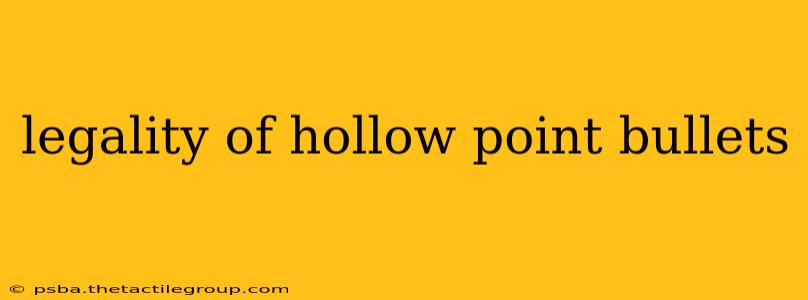The legality of hollow point bullets, also known as expanding bullets, varies significantly depending on location. There's no single global or even national standard; understanding the specific laws where you live and intend to use them is crucial. This guide provides a comprehensive overview of the legal landscape surrounding these controversial projectiles.
What are Hollow Point Bullets?
Hollow point bullets are designed with a cavity in their tip. This design facilitates expansion upon impact, increasing the bullet's stopping power. This increased stopping power is often cited as a benefit for law enforcement and self-defense, as it can reduce the risk of overpenetration and collateral damage. However, this same characteristic is the source of much of the legal and ethical debate surrounding their use.
Legal Status in the United States
The legality of hollow point bullets in the United States is complex and depends largely on state and local laws, rather than federal regulations. While federal law doesn't explicitly ban them, certain jurisdictions have restrictions.
Federal Laws:
- No outright federal ban: The federal government doesn't prohibit the manufacture, sale, or possession of hollow point ammunition.
- Focus on interstate commerce: Federal laws primarily regulate the interstate commerce of firearms and ammunition, with some restrictions on certain types of ammunition considered "destructive devices." Hollow point bullets generally don't fall under this category.
State and Local Laws:
- Variability: State and local laws concerning hollow point ammunition show significant variability. Some states or municipalities may restrict or prohibit their use entirely, especially for hunting specific game animals.
- Hunting restrictions: Many states have specific regulations regarding the types of ammunition allowed for hunting various animals. Hollow points may be restricted or prohibited for certain game due to their potential for excessive damage or causing unnecessary suffering.
- Self-defense: While not typically outright banned for self-defense, the use of hollow point ammunition in self-defense situations is subject to the same legal standards as any other use of force. This means the use must be justified as necessary and proportional to the perceived threat.
Legal Status in Other Countries
Outside the United States, the legal landscape regarding hollow point ammunition is equally diverse. Many countries have stricter regulations than the U.S., with some outright banning them for civilian use. Others may have licensing requirements or restrictions on their sale and use. Specific research into the laws of the relevant country is necessary.
Ethical Considerations
Beyond the legal aspects, the ethical use of hollow point bullets is a significant point of discussion. The increased stopping power, while potentially beneficial in self-defense scenarios, also raises concerns about the potential for excessive force and unnecessary harm. Responsible firearm ownership includes understanding these ethical implications.
Key Considerations Before Purchasing or Using Hollow Point Ammunition
- Check your local and state laws: This is the most crucial step. Ignorance of the law is not a defense.
- Understand the intended use: Hollow points are not appropriate for all applications. Their use should be carefully considered and aligned with their intended purpose.
- Practice responsible firearm handling: Safe gun handling practices remain paramount, regardless of the type of ammunition used.
- Consult legal counsel: If you have any doubts or questions about the legality of hollow point ammunition in your jurisdiction, consult with an attorney specializing in firearms law.
This information is for educational purposes only and does not constitute legal advice. Always consult with relevant legal authorities and experts before making any decisions regarding the purchase, possession, or use of hollow point ammunition. The laws and regulations surrounding firearms and ammunition are complex and subject to change.

